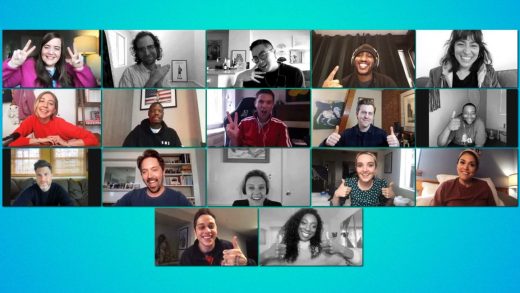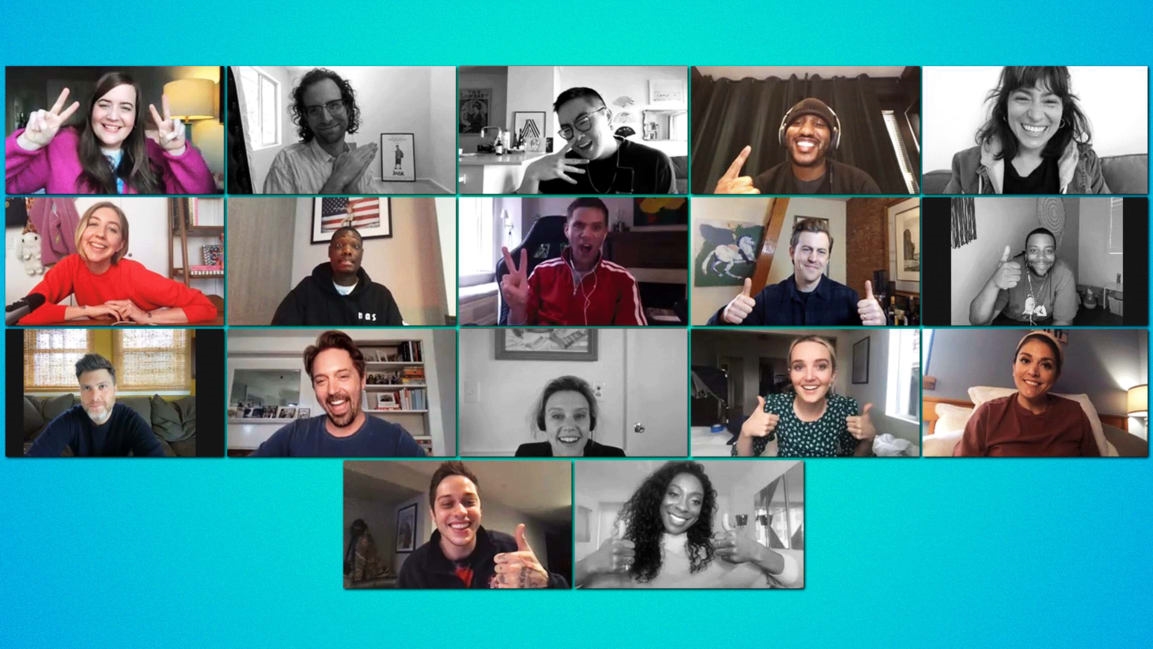‘SNL’ lets loose with TV’s most ambitious quarantine episode yet
On the inevitable Zoom sketch in the waters-testing first episode of Saturday Night Live’s quarantine era, two tech-averse employees (Aidy Bryant and Kate McKinnon) cannot figure out the nuances of teleconferencing.
Or even the basics.
Their team leader (Mikey Day) reassures them, however generously, that “we’re all learning here.”
The same could be said for the team at SNL right now—and it’s thrilling to watch them work out the kinks in real time.
That Zoom sketch captures the reality of how a lot of people are adjusting to the virtual workplace. “Are any of you wearing pants? Be honest,” Chris Redd’s character asks when he’s introduced, exactly the kind of joke people crack on these calls that makes the situation feel more normal.
In its best moments, that’s what this experimental SNL episode does: Make our collective quarantine feel more normal, with better jokes than The Funny Guy/Gal at the Office can muster—and loads of show-must-go-on gusto. Unlike Bryant and McKinnon’s terrified technophobes (“We ruined the Zoom!” Kate despairs at one point), even the show’s not-so-great-moments show promise and a desire to learn and adapt.
“Live from Zoom, it’s sometime between March and August,” McKinnon announces at the top of the episode, in lieu of a cold open. We’re then treated to rejiggered opening credits, which find the cast members vogueing at home, rather than gallivanting around New York City. It’s a light reminder that the Oyster Bar in Grand Central Station is closed, there’s nowhere to go, and for once, nightlife-loving New Yorkers don’t have much else to do except watch SNL. (Or, you know, anything else—especially Tiger King, which is referenced here no less than three separate times.)
Just like every late-night comedy show on TV now, SNL‘s inaugural At Home outing explores the various modes of making jokes directly to camera in one’s apartment. Like all things comedy, some of it succeeds better than other parts. Larry David’s Bernie Sanders bit is notable only for how hard the writers finally go at presumptive nominee Joe Biden. Otherwise, it’s totally inert, a demonstration of how jokes that come filtered through minor, fuzzy video-chat distortion and no studio audience laughter can be not only not funny, but anti-funny.
Weekend Update addresses this issue by bringing in some audience members via Zoom to laugh at Michael Che and Colin Jost’s jokes. (The political comedy podcaster Jon Lovett has tried the same thing in recent episodes of his hit show, Lovett or Leave It, as well.) Although audiences could be forgiven for fixating on Jost’s decision to train his camera not against the wall but toward his lavishly appointed apartment (with a guitar placed conspicuously in-frame, resting comfortably on what looks to be an expensive leather sofa), when these jokes do land, the laughter helps highlight it.
The best use of the jokes-straight-to-camera format, however, is Tom Hanks’s monologue—filmed from the kitchen of a home that is trying way less hard than Jost’s to impress.
The monologue hits because of smart joke-writing centered around both what this moment feels like, and Hanks’s general Hanksiness.
“Ever since being diagnosed [with COVID-19],” he says, “I have been more like America’s Dad than ever before . . . since no one wants to be around me for very long, and I make people uncomfortable.”
Hanks then further calls out the weirdness of the occasion, building on McKinnon’s “sometime between March and August” line, by declaring that “there’s no such thing as Saturday now—there’s just Today,” and takes some playful jabs at SNL‘s fluctuating hit-to-miss ratio. This is humor with a purpose: to help people get through a uniquely tough time. In that regard, it recalls the show’s first episode after 9/11. (“Can we be funny?” “Why start now?”)
What separates our current situation from post-9/11 panic—besides almost everything—is that the cast now has to deal with having the same resources as a fledgling YouTuber, albeit one with access to world-class postproduction wizards. McKinnon’s extends her Ruth Bader Ginsburg impression beyond a Weekend Update spot into a whole segment, despite the absence of a wig, and it feels too long at just under four minutes. Fortunately, the limitation also forces the writers to come up with creative sight gags, like using Q-Tips and batteries as part of Ginsburg’s at-home workout regimen.
Elsewhere, Pete Davidson takes two big swings at music video parodies, apparently directed by his mom. Neither one quite works. The first is neither specific nor savage enough in its takedown of Drake, and the second is only too specific in its send-up of rappers flashing a relatively paltry amount of cash in their videos, a trope that feels dated. (I could be wrong—I’m dangerously close to 40 years old.) However, these two sketches show what Davidson and his mom are capable of concocting with very little equipment. All they need now is the right concept.
The episode finds its sweet spot, though, when either exploring the formats content creators typically produce at home—makeup tutorials and Twitch streams—or leaning hard into absurdity—as with Alex Moffat’s indoor sports sketch, or Beck Bennett and Kyle Mooney FaceTiming a syncopated brainstorming sesh.
Some cast members are better suited to the limitations of being At Home than others, however, and none more so than Chloe Fineman, who comes to SNL this season from the world of Instagram comedy. (She’s also a Groundling, to be fair.) Her triptych of impersonations packaged as a MasterClass ad, which includes Timothée Chalamet and Tiger King’s Carole Baskin, were so funny and on point that they kind of ran away with the whole episode. It’s a telling commentary on the times that the digital native cast members are now poised to become the show’s heaviest hitters.
Finally, after a touching tribute to recently deceased composer and creative Hal Willner, the credits roll over an eerie shot of the empty studio where everyone hugs to commemorate the end of another episode on a usual Saturday. But this wasn’t a usual Saturday, it was just another Today taking place “sometime between March and August”—with the unspoken, heartbreaking possibility hanging in the air that this new mode of SNL could extend far beyond summer.
Fast Company , Read Full Story
(31)



